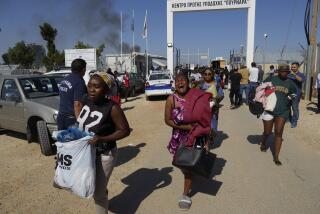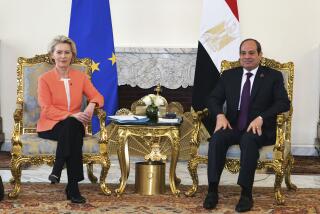Cyprus wakes to bailout hangover
ATHENS -- Defending a last-resort deal with international lenders, bleary-eyed officials on Cyprus said Monday that they had managed to avert a devastating default for the tiny Mediterranean nation and kept it from being forced out of Europe’s single-currency family.
Cypriots, though, woke up wondering whether the situation they faced this week was more troubling than the mess they confronted the week before.
As the fifth country in the troubled Eurozone to take a bailout, Cyprus put an end to a week of high-stakes negotiations when its president, Nicos Anastasiades, agreed to share the cost of a $20.5-billion rescue package by taxing bank stake holders.
It was the second time in nine days that Anastasiades, the European Union and the International Monetary Fund had agreed to a blueprint for a bailout. But while the first one, reached on March 16, fell apart three days later because of fierce opposition to a bank levy of up to 10% for big bank deposits, Monday’s agreement carried even stiffer terms and appeared final.
“We’ve put an end to the uncertainty that has affected Cyprus and the euro area over the past week,” said Dutch Finance Minister Jeroen Dijsselbloem.
Cypriot leaders, however, were more reserved.
“It is a bad deal,” said Lefteris Christoforou, leading lawmaker of the ruling Democratic Party. “But the extreme scenario we had to contend with -- a disorganized default -- was worse.”
[Updated 3:15 p.m. March 25: In a dramatic televised address, Anastadiades described the deal as “painful, but the best possible … under existing conditions.” Faced with public anger and frustration over Europe’s tough approach to the island’s debt crisis, he cautioned against calls for an exit from the Eurozone.
“Isolation,” he said sternly, “is not a solution.”
He called on Cypriots to “look forward with optimism” and “try and turn the present crisis into an opportunity to set stable foundations for the country’s future.”]
While details of the deal remain to be ironed out in the coming weeks, Cypriots are taking stock of its complex essence.
On the streets, people complained of feeling helpless in the face of the international financial system.
“Nobody knows where we are heading,” said Epifanos Epifaniou, 50, who used to drive a delivery truck in Nicosia and has been unemployed for six months. “People are playing games with Cyprus. We are alone. Nobody is supporting us,” he told Bloomberg News.
Under the plan, a financial catastrophe would be averted by winding down the country’s second-biggest bank, the largely state-owned Cyprus Popular Bank, also known as Laiki, and shifting deposits under $130,000 to its biggest bank -- the Bank of Cyprus -- to create a “good bank,” leaving problems behind in, effectively, a “bad bank.”
Deposits above $130,000 in both banks would be frozen and put to use to resolve Laiki’s debts and recapitalize the Bank of Cyprus. Laiki would then effectively be shuttered.
Small depositors with accounts under $130,000 would be spared from any form of bank levy, but restrictions on the movement of capital will be put in place to avert massive bank runs when much of the island’s financial system opens Tuesday.
On Monday, though, panic appeared to percolate through the balmy streets of Nicosia, the capital. Hundreds of Cypriots were seen lining up at ATMs, trying to withdraw whatever sums were left in their accounts -- a move that the country’s central bank tried to control over the weekend by imposing a $130 cap on daily withdrawals.
After a tumultuous week that fanned fears of a new financial crisis, European officials greeted the rescue deal with relief. Cyprus’ best banking customer, Russia, sent mixed signals, with President Vladimir Putin promising to help with the crisis and Prime Minister Dmitry Medvedev lashing out.
Rich Russians hold about a third of the estimated $88 billion in deposits in Cyprus. Since the breakup of the Soviet Union, the tiny island has lured Russia’s super-rich as a low-tax business haven, offering even citizenship in exchange for $20 million in bank deposits and direct investments.
Putin ordered the Finance Ministry to revisit its efforts to restructure Cyprus’ debt to Russia. In 2011, Moscow lent $2.5 billion to Cyprus until 2016, at 4.5% annual interest.
Last week, the Cypriot finance minister, Michalis Sarris, spent three days in Moscow in talks to extend the payment of the current loan to 2022 and possibly secure a new loan. Those talks yielded nothing.
“Putin considers it possible to support the efforts of Cyprus’ president and [European officials] aimed at overcoming the crisis,” Putin’s spokesman, Dmitry Peskov, said to journalists Monday.
Medvedev, however, expressed fear that the bailout agreement might amount to “robbery” of Russian deposits.
“I think they are continuing to rob what’s been robbed already,” Medvedev said at a government meeting Monday. “We need to understand what all this story could materialize into ... and what consequences it could entail for the international finance and currency system.”
For the record, 3:15 p.m. March 25: A previous version of this post quoted Lefteris Christoforou as saying, “It’s not a bad deal.” The quote should read: “It is a bad deal.”
ALSO:
Syrian rebel commander badly hurt in car bombing
Kerry arrives for Afghanistan visit, will skip Pakistan for now
African Union suspends Central African Republic after president ousted
Sergei Loiko in The Times’ Moscow bureau contributed to this report.
More to Read
Start your day right
Sign up for Essential California for news, features and recommendations from the L.A. Times and beyond in your inbox six days a week.
You may occasionally receive promotional content from the Los Angeles Times.






